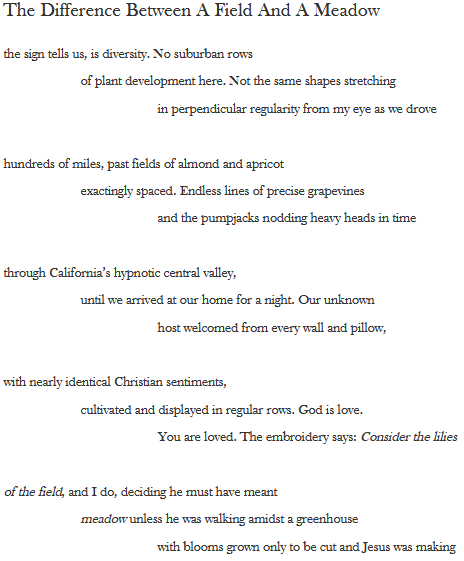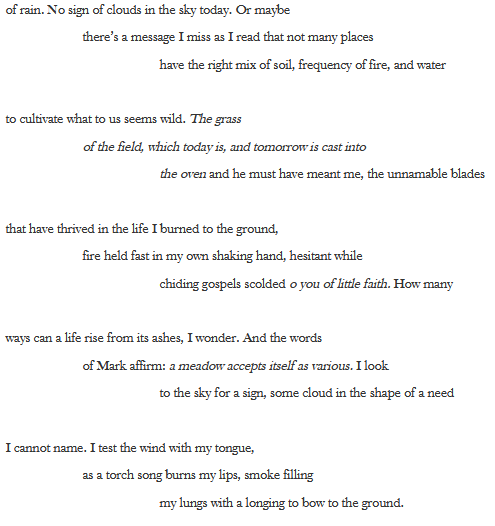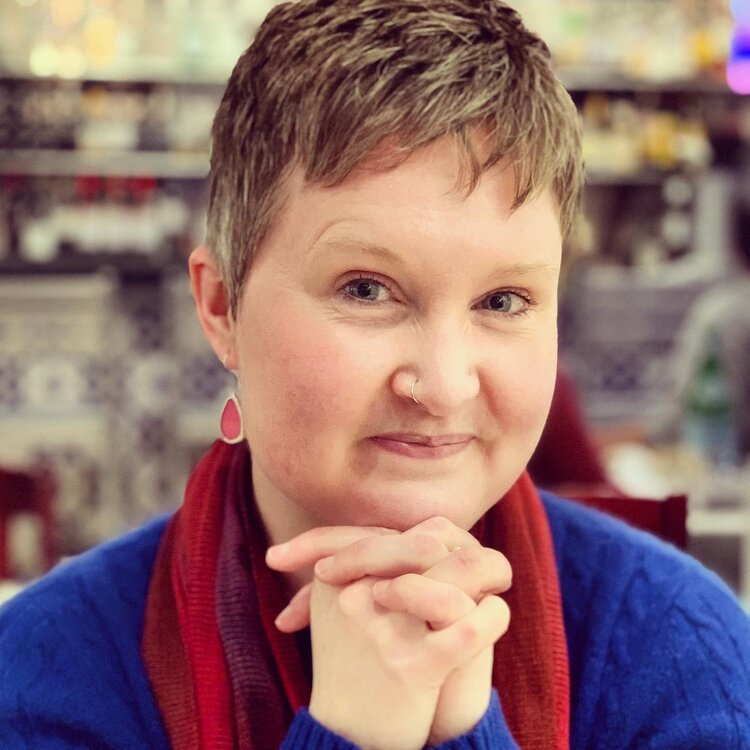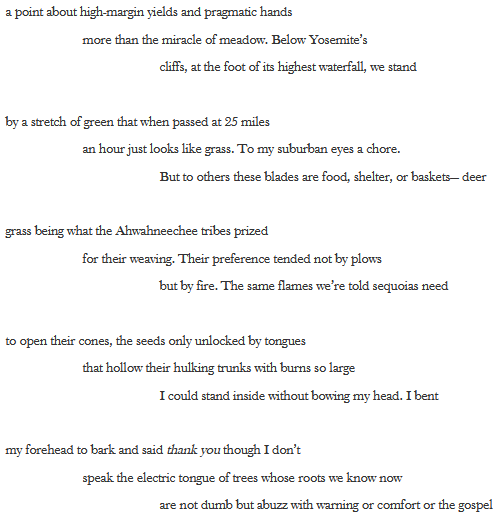When did you first encounter poetry? How did you discover that you wanted to write poems?
I first discovered poetry in middle school. I was drawn to the delightful strangeness of e.e.cummings’ language, the quirky sage voice of Emily Dickenson, and the vivid, dramatic imagery of Sylvia Plath. I began writing around that time too, though I didn’t show the poems to many people—I had been told my poems were “depressing” and that discouraged me from letting others see my work. But I kept writing and in high school won the distinction of being my class poet laureate. I didn’t realize it was rare at the time, but the position was a working laureateship—I had to publish a new poem for each issue of the school newspaper, complete a few readings in the community, and compose an original poem for graduation. Under the kind mentorship of English teacher Louis Gabordi, my writing really started to flourish. I credit him and that opportunity for really establishing me as a writer, beyond those first angsty diary poems.
Do you have a writing routine? A favorite time or place to write?
I used to write regularly and then I became a mom and all my routines went out the window! Generally, I like to write new poems first thing in the morning, when my language is still a little slippery and my thoughts a little fuzzy. I have an overactive internal “editor” who has trouble letting me write before he fixes it. But he’s a late riser, so I find I can more easily create if I write before he’s awake! Then I find an afternoon time slot where the “editor” part of me can look over what I wrote in the morning.
Now that I’m caring for an infant though, my favorite time is whatever time I can find! I try to keep expectations to a minimum during these catch-as-catch-can moments and just read or write whatever brings me joy. I love being a mom, but those moments when I can be alone with a book or my own thoughts are so important to stay connected to my sense of self and the world beyond my little family.
Where do your poems most often “come from”—an image, a sound, a phrase, an idea?
Lately, I’ve been writing a series of poems in response to a collection of old family photographs. I remember seeing the photos and telling my mom, “These are poems. I don’t know how yet, but somehow they’re poems.” Inspiration is often like that for me, whether it comes from an image or another’s writing or a bit of language I overhear. There’s a little antenna inside that I’ve slowly learned to listen to and it picks up poems in the world around me in some of the most uncanny places.
Which writers (living or dead) have influenced you the most?
I mentioned a few of the first poets earlier. In early adulthood, I gravitated toward Edna St. Vincent Millay and Elizabeth Bishop. Then I discovered slam poetry and immersed myself in YouTube videos of Rachel McKibbens, Marty McConnell, alongside a newfound obsession with Mary Oliver. Oh, and Richard Siken—I carried Crush on me at all times for several years. Then in my MFA years, I was introduced to H.D, Eloise Klein-Healey, Ellen Bass, Mark Doty, and Adrienne Rich, among many others, each of which I think left their mark on my own writing. I’m a bit of an omnivorous reader. I find I get most excited about juxtapositions and conversations between poets, rather than any one writer or collection.
What excites you most about your new collection?
Thematically, I wrote the chapbook I most needed to read a decade ago. The collection is a semi-autobiographical account of coming out as a lesbian in the evangelical church and works through personal themes of faith and doubt, losing and finding love and community, and the radical recovery of embodiment. I’m most excited for this collection to find the readers that need its companionship most.



Erica Charis-Molling is a lesbian poet, educator, and librarian. Her writing has been published in numerous literary journals and one anthology. Her poems have been nominated for the Pushcart Prize and Orison anthology. Her cross-disciplinary collaborative work has been performed at Lesley University, the Dance Complex, and other Boston-area venues. A Mass Cultural Council Fellow, she’s an alum of the Bread Loaf Writers’ Conference and received her M.F.A. in Creative Writing from Antioch University. She currently serves as Co-Editor-in-Chief of Solstice Literary Magazine and lives in western Massachusetts with her wife, daughter, and fur babies.


